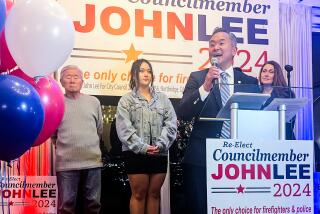Lively Mayor’s Race Shaping Up
- Share via
Although nearly 18 months remain before voters go to the polls, it’s clear that the mayor’s race will be far livelier than usual.
With Antonio Villaraigosa’s announcement of his candidacy last month “after a year speculation and introspection,” the speaker of the state Assembly joined a crowded and varied field. Already in the race were Steve Soboroff, a real estate broker and unpaid senior advisor to Mayor Richard Riordan; City Atty. James K. Hahn, and City Councilman Joel Wachs, who last week announced he is gay, a public disclosure that some say could provide a fund-raising advantage.
For the record:
12:00 a.m. Nov. 17, 1999 For the Record
Los Angeles Times Wednesday November 17, 1999 Home Edition Metro Part B Page 8 Editorial Writers Desk 1 inches; 28 words Type of Material: Editorial; Correction
Mayoral race--An editorial Tuesday on mayoral candidates should have stated that the late Tom Bradley served 20 years, not 16, as Los Angeles mayor and that Kathleen Connell is the state controller.
Still on the political sidelines are state Treasurer Kathleen Connell, Rep. Xavier Becerra (D-Los Angeles) and county Supervisor Zev Yaroslavsky.
The April 2001 contest promises to provide something Los Angeles hasn’t seen in a while--a real horse race and a sharp debate on the future of the city. Riordan won an easy victory against Tom Hayden in 1997 (the state senator, a Los Angeles Democrat, is said to be looking at a run for some municipal office again), and in 1993 Riordan scored a decisive win over then-City Councilman Michael Woo. Tom Bradley, Riordan’s predecessor, served an unprecedented four terms, 16 years.
A two-term limit requires Riordan to leave office. No less important, the office that he will turn over is much different from the one he inherited in 1993. The new city charter that voters approved in June, which takes effect next July, will give the next mayor important new powers. He or she will have far more latitude to hire and fire general managers and commissioners, reorganize departments and transfer personnel, all in the name of improving city services and making employees accountable. Chronic complaints about poor service, micromanaging by the council and a lack of accountability in departments led charter drafters to clarify the lines of authority and put somewhat more power in the mayor’s hands.
For all of his whining about the office’s formal lack of authority under the old charter, complaints that eventually gave rise to the charter redrafting effort, Riordan has shown an ability to move issues over which he has no direct control. Riordan’s frustration with conditions at the Los Angeles Unified School District and his active support of challengers to incumbent school board members set the stage for the current shake-up in the district. This lesson is not likely to be lost on Riordan’s successor.
More to Read
Sign up for Essential California
The most important California stories and recommendations in your inbox every morning.
You may occasionally receive promotional content from the Los Angeles Times.













